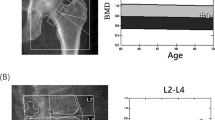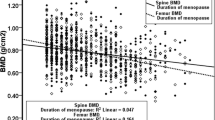Abstract
Introduction
Osteoporosis remains under-diagnosed, particularly in African American men, despite the availability of reliable diagnostic tests. In women, several screening tools, including heel ultrasound and clinical assessment tools, reliably predict low bone mass, however the usefulness of these screening tools in African American men is unknown. The aim of this study was to determine the utility of screening tools, namely heel ultrasound, the osteoporosis self-assessment tool (OST), weight-based criterion (WBC) and body mass index (BMI), in screening for low bone mass in African American men.
Materials and methods
African American men 35 years of age and older were invited to participate. The OST risk index is a score based on age and weight [(weight in kilograms – age in years) × 0.2]. Bone mineral density (BMD) of the heel was measured by heel ultrasound, and BMD of both the lumbar spine and hip were determined by dual energy X-ray absorptometry (DXA). One hundred and twenty-eight men fulfilled the inclusion criteria for our study.
Results
The population prevalence of osteopenia and osteoporosis were 39% and 7%, respectively. Using a heel ultrasound T-score cut-off value of −1 or less, we predicted low bone mass (T-score of −2 or less at the hip) with a sensitivity of 83%, a specificity of 71% and an area under the curve (AUC) of 0.80. Using an OST cut-off value of 4, we predicted low bone mass with a sensitivity of 83%, a specificity of 57% and an AUC of 0.83. The OST risk index ranged from 18.1 to −6.1, based on which we categorized risk as: low, 5 or greater; moderate, 0–4; high, −1 or less. Of the men with a high-risk OST score, 87% had either osteopenia or osteoporosis based on World Health Organization (WHO) criteria. Using the WBC alone with a cut-off value of 85 kg, we predicted low bone mass with a sensitivity of 74%, a specificity of 50% and an AUC of 0.70. A BMI cut-off value of 30 or greater yielded a sensitivity of 83%, a specificity of 43% and an AUC of 0.70 for the diagnosis of low bone mass.
Discussion
The prevalence of osteopenia and osteoporosis were unexpectedly high in outpatient African American male veterans, who are considered to be at low risk for low bone mass. Heel ultrasound was able to predict low bone mass with sufficiently high sensitivity and specificity for use as a screening tool. Surprisingly, WBC and BMI proved ineffective in predicting low bone mass with adequate sensitivity and specificity. The OST, a clinical formula based on weight and age, appeared to be an easy and reliable screening tool for identifying men at high risk for low bone mass.


Similar content being viewed by others
References
Kanis JA, Johnell O, Oden A, De Laet C, D Mellstrom (2004) Epidemiology of osteoporosis and fracture in men. Calcif Tissue Int 75:90–99
Seeman E, Bianchi G, Adami S, Kanis J, Khosla S, Orwoll E (2004) Osteoporosis in men – consensus is premature. Calcif Tissue Int 75:120–122
Forsen L, Sogaard AJ, Meyer HE, Edna T, Kopjar B (1999) Survival after hip fracture: short and long-term excess mortality according to age and gender. Osteoporos Int 10:73–78
Center JR, Nguyen TV, Schneider D, Sambrook, Eisman JA (1999) Mortality after all major types of osteoporotic fracture in men and women: an observational study. Lancet 353:878–882
Trivedi DP, Khaw KT (2001) Bone mineral density at the hip predicts mortality in elderly men. Osteoporosis Int 12:259–265
NIH Consensus Development Panel (2001) Osteoporosis prevention, diagnosis and therapy. JAMA 285:785–795
Genant HK, Cooper C, Poor G et al. (1999) Interim report and recommendations of the WHO task force for osteoporosis. Osteoporos Int 10:259–264
US Preventive Services Task Force (2002) Screening for osteoporosis in postmenopausal women: recommendations and rationale. Ann Int Med 137:526–528
Nelson HD, Helfand M, Woolf SH, Allan JD (2002) Screening for postmenopausal osteoporosis: a review for the US preventative services task force. Ann Intern Med 137:529–541
Njeh CF, Fuerst T, Diessel E, Genant HK (2001) Is quantitative ultrasound dependent on bone structure? A reflection. Osteoporos Int 12:1–15
Khaw KT, Reeve J, Luben R, Bingham S (2004) Prediction of total and hip fracture risk in men and women by quantitative ultrasound of the calcaneus: EPIC-Norfolk prospective population study. Lancet 363:197–202
Kung A, Ho A, Sedrine W, Reginster JY (2003) Comparison of a simple clinical risk index and quantitative bone ultrasound for identifying women at increased risk of osteoporosis. Osteoporos Int 14:716–721
Bauer DC, Gluer CC, Cauley J, Vogt TM, Ensrud KE, Genant HK, Black DM (1997) Broadband ultrasound attenuation predicts fractures strongly and independently of densitometry in older women: a prospective study. Arch Intern Med 157:629–634
Siris ES, Miller PD, Barrett-Connor E, Faulkner KG, Wehren LE, Abbott TA, Berger ML, Santora AC, Sheerwood LM (2001) Identification and fracture outcomes of undiagnosed low bone mineral density in postmenopausal women. JAMA 286:2815–2822
Hans D, Durgent-Molina P, Schott AM, Sebert JL, Cormier C, Kotzki PO, Delmar PD, Pouilles JM, Breart G, Meunier PJ (1996) Ultrasonographic heel measurements to predict hip fracture in elderly women: the EPIDOS prospective study. Lancet 348:511–514
Gonnelli S, Cepollaro C, Gennari L, Montagnani A, Caffarelli C, Berlotti D, Rossi S, Cadirni A, Nuti R (2005) Quantitative ultrasound and dual-energy X-ray absorptometry in the prediction of fragility fracture in men. Osteoporos Int 16:963–968
Adler RA, Funkhouser HL, Petkov VI, Elmore BL (2003) Osteoporosis in pulmonary clinic patients: does point-of-care screening predict central dual-energy X-ray absorptiometry? Chest 123:2012–2018
Adler RA, Funkhouser HL, Holt CM (2001) Utility of heel ultrasound bone density in men. J Clin Densitom 4:225–230
Montagnani A, Gonnelli S, Cepollaro C, Mangeri M (2001) Usefulness of bone quantitative ultrasound in management of osteoporosis in men. J Clin Densitom 4:231–237
Mulleman D, Legroux-Gerot I, Duquesnoy B, Marchandise X (2002) Quantitative ultrasound of bone in male osteoporosis. Osteoporos Int 13:388–393
Pluskiewicz W, Drozdzowska B (1999) Ultrasound measurements at the calcaneus in men: differences between healthy and fractured persons and the influence of age and anthropometric features on ultrasound parameters. Osteoporos Int 10:47–51
Cadarette SM, McIsaac WJ, Hawker GA, Jaakkimainen L (2004) The validity of decision rules for selecting women with primary osteoporosis for bone mineral density testing. Osteoporos Int 15:361–366
Michaelsson K, Bergstrom R, Mallmin H, Holmberg L, Wolk A, Ljunghall S (1996) Screening for osteopenia and osteoporosis: selection by body composition. Osteoporos Int 6:120–126
Koh LK, Ben Sedrine W, Torralba TP, Kung A, Fujiwara S, Chan SP, Huang QR, Rajatanavin R, Tsaik S, Park HM, Reginster JY (2001) A simple tool to identify Asian women at increased risk of osteoporosis. Osteoporos Int 12:699–705
Cadarette SM, Jaglal SB, Murray TM, McIsaac WJ, Joseph L, Brown JP (2001) Evaluation of decision rules for referring women for bone densitometry by dual-energy X-ray absorptiometry. JAMA 286:57–63
National Osteoporosis Foundation (1999) Physicians guide to prevention and treatment of osteoporosis. Rxcerpta Medica, Bille Mead, N.J.
Lydick E, Cook K, Turpin J, Melton M, Stine R, Byrnes C (1998) Development and validation of a simple questionnaire to facilitate identification of women likely to have low bone density. Am J Manag Care 4:37–48
Cadarrette SM, Jaglal SB, Krieger N, McIsaac WJ, Darlington GA, Tu JV (2000) Development and validation of the osteoporosis Risk Assessment Instrument to facilitate selection of women for bone densitometry. Can Med Assoc J 162:1289–1294
Weinstein L, Ullery B (2000) Identification of at-risk women for osteoporosis screening. Am J Obstet Gynecol 183:547–549
Cadarette SM, Jaglal SB, TM Murray (1999) Validation of the simple calculated osteoporosis risk estimation (SCORE) for patient selection for bone densitometry. Osteoporos Int 10:85–90
Kung A, Ho A, Ross P, Reginster JY (2005) Development of a clinical assessment tool in identifying Asian men with low bone mineral density and comparison of its usefulness to quantitative bone ultrasound. Osteoporos Int 16:849–855
Poriau S, Geusens P, Van den Bosch F, De Keyser F (2004) Osteoporosis screening: comparison of heel ultrasound measurement to calculated risk assessment tools (Abstract). American Society for Bone and Mineral Research (ASBMR) Meeting. Seattle, p 149
Adler RA, Tran M, VI Petkov (2003) Performance of the osteoporosis self-assessment screening tool for osteoporosis in American men. Mayo Clin Proc 78:723–727
Geusens P, Hochberg MC, Van der Voort DJM, Pols H, Van Der Klift M, Siris E, Melton ME, Turpin J, Byrnes C, Ross P (2002) Performance of risk indices for identifying low bone density in postmenopausal women. Mayo Clin Proc 77:629–637
Sen SS, Geling O, Messina OD (2002) Comparison of body weight and body mass index as predictors for osteoporosis among postmenopausal Latin American women. Osteoporos Int 13 [Suppl 3]:S27
The Writing Group for the ISCD Position Development Conference (2004) Diagnosis of osteoporosis in men, premenopausal women, and children. J Clin Densitom 7:17–26
Binkley NC, Schmeer P, Wasnich RD, Lenchik L (2002) What Are the criteria by which a densitometric diagnosis of osteoporosis can be made in males and non-Caucasians? J Clin Densitom 5:S19–27
Kannis JA, Gluer CC – for the Committee of Scientific Advisors, International Osteoporosis Foundation (2000) An update on the diagnosis and assessment of osteoporosis with densitometry. Osteoporos Int 11:192–202
Schuit SCE, Van der Klift M, Weel AEAM, De Laet CEDH (2004) Fracture incidence and association with bone mineral density in elderly men and women: the Rotterdam study. Bone 34:195–202
DeLaet CEDH, Van der Klift M, Hofman A, Pols HAP (2002) Osteoporosis in men and women: a story about osteoporosis thresholds and hip fracture risk. J Bone Miner Res 117:2231–2236
Kanis JA (2002) Diagnosis of osteoporosis and assessment of fracture risk. Lancet 359:1929–1936
Lu-Yao GL, Baron JA, Barrett JA, Fisher ES (1994) Treatment and survival among elderly Americans with hip fractures: a population-based study. Am J Public Health 84:1287–1291
Cooper C, Atkinson EJ, Jacobsen SJ, O’Fallon WM and Melton LJ III (1993) Population-based study of survival after osteoporotic fractures. Am J Epidemiol 137:1001–1005
Broussard DL, Magnus JH (2004) Risk assessment and screening for low bone mineral density in a multi-ethnic population of woman and men: does one approach fit all? Osteoporos Int 15:3493–360
Edelstein SL, Barrett-Connor E (1993) Relation between body size and bone mineral density in elderly men and women. Am J Epidemiol 138:160–169
Hannan MT, Felson DT, Dawson Hughes B, Tucker KL, Cupples LA, Wilson PW, Kiel DP (2000) Risk factors for longitudinal bone loss in elderly men and women: the Framingham osteoporosis study. J Bone Miner Res 15:710–720
Legrand E, Chappard D, Pascaretti C, Duquenne M, Rondeau C, Simon Y (1999) Bone mineral density and vertebral fractures in men. Osteoporos Int 10:265–270
Njeh CF, Fuerst T, Diessel E, HK Genant (2001) Is quantitative ultrasound dependent on bone structure? a reflection. Osteoporos Int 12:1–15
Gluer CC (1997) Quantitative ultrasound techniques for the assessment of osteoporosis: expert agreement on current status. J Bone Miner Res 12:1280–1288
Langton CM, Ballard PA, Bennett DK, Purdie DW (1997) A comparison of the sensitivity and specificity of calcaneal ultrasound measurements with clinical criteria for bone densitometry (DXA) referral. Clin Rheumatol 16:117–118
Hochberg MC, Tracy JK, Van Der Klift M, Pols H (2002) Validation of a risk index to identify men with increased likelihood of osteoporosis (Abstract). J Bone Miner Res 17[Suppl 1]:SA231/SA095
Williams MI, Petkov VI, Johnson SL, Wright S et al. (2003) Applying the osteoporsosis self-assessment tool (OST) in primary care practices uncovers osteoporosis in men: preliminary report (Abstract). American Society for Bone and Mineral Research (ASBMR) meeting, SA 314
Acknowledgement
Cecilla Lin is gratefully acknowledged for her invaluable assistance in performing our DXA scans.
Author information
Authors and Affiliations
Corresponding author
Rights and permissions
About this article
Cite this article
Sinnott, B., Kukreja, S. & Barengolts, E. Utility of screening tools for the prediction of low bone mass in African American men. Osteoporos Int 17, 684–692 (2006). https://doi.org/10.1007/s00198-005-0034-5
Received:
Accepted:
Published:
Issue Date:
DOI: https://doi.org/10.1007/s00198-005-0034-5




